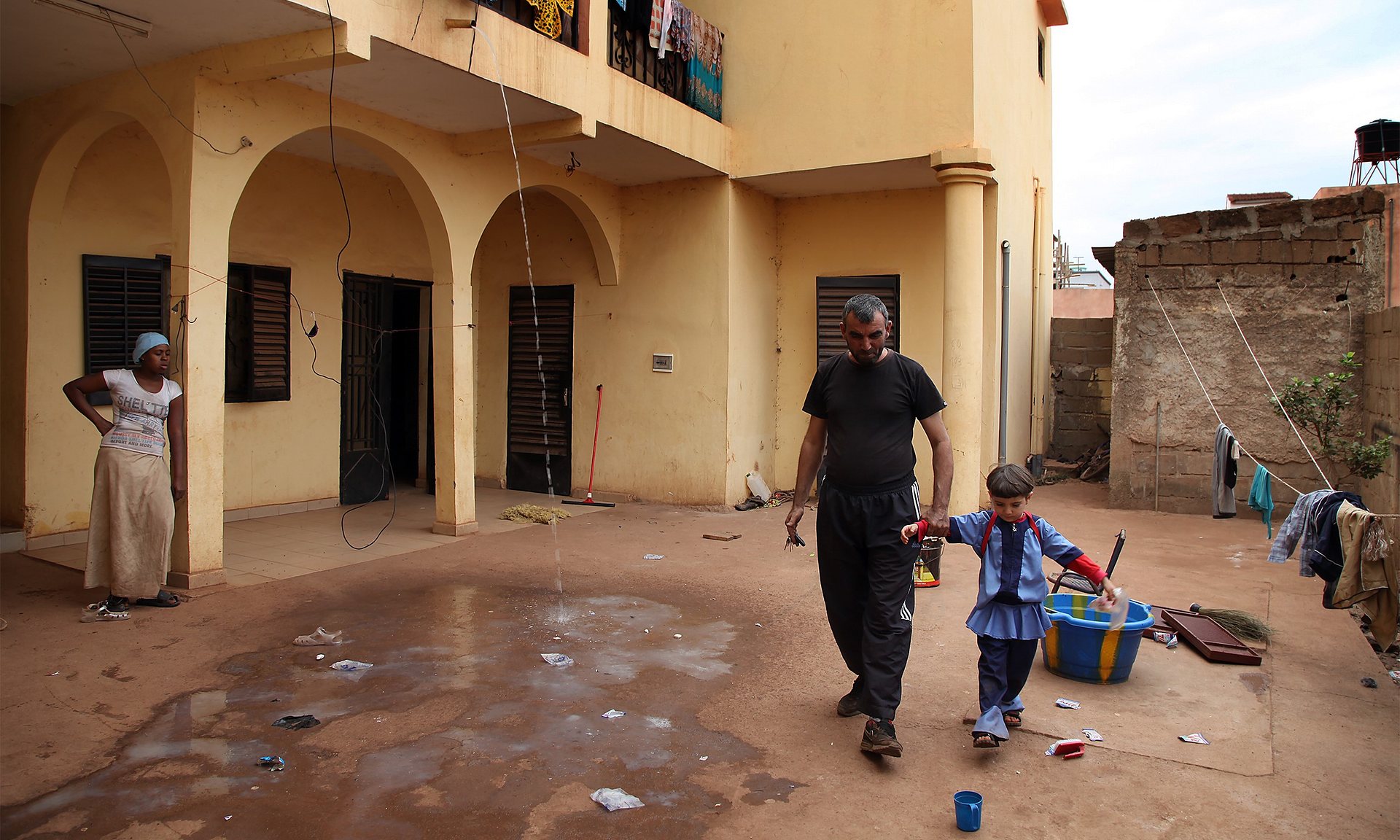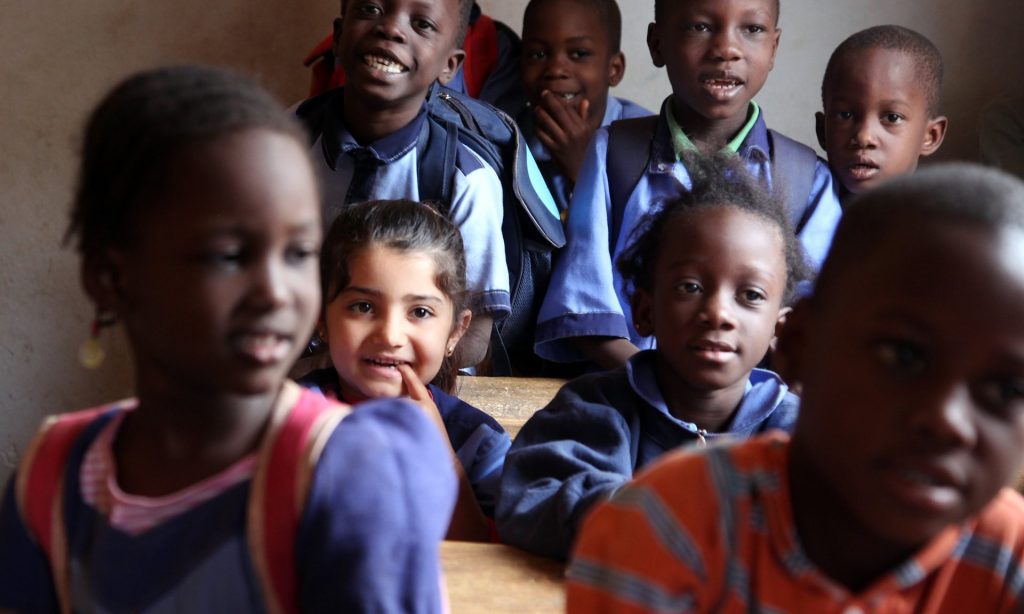Fearful of the Mediterranean crossing and confused by reports of a European refugee lockdown, Syrians are seeking the precarious safety of Mali – which is itself on humanitarian life support and faces severe security challenges.
“Even this is better than aerial bombardments,” says former Idlib taxi driver Abdulhamid Daher, 57. He sits behind the national stadium, Stade du 26 Mars, in Bamako. A friend from the same city in north-west Syria has a job guarding a lorry parked on the wasteland. Daher spends his days here drinking tea, except Mondays. That is when he goes to the German embassy to ask when he might be able to join his wife and seven children in Dortmund. The routine has been the same for seven months.
Reports from northern Mali indicate that hundreds of people – perhaps up to 2,000 – have migrated from Syria since October. But the figures are unconfirmed. No one keeps records at In-Khalil – a border post in the desert between Mali and Algeria.
The picture is clearer in Bamako. Last month, the UN refugee agency (UNHCR) confirmed that it has registered 92 Syrians in Mali’s capital. All but 10 of them have been granted refugee status. Most, like Daher, want to join relatives in Europe.
“We were separated by the war. When the bombing started I sent my wife and small children to another neighbourhood of Idlib. One of my sons had a job on a building site in Libya. He was able to get them out, and to get them to Italy then Germany. I got out later.”
So far, Daher’s journey has covered nearly 7,000km. From Syria, he fled to Turkey – “The Mediterranean was too frightening.” He spent five months in Mauritania’s capital, Nouakchott, before travelling to Mali.
“I came to Bamako because there are other Syrians here and the Malians have a good reputation. The people here do not speak Arabic. But they are kind. We never go hungry. Our biggest problem is the filth and the mosquitoes that give us malaria,’’ says Daher, a diabetic who receives treatment at a state hospital.
Mali, one of the poorest countries in the world, is better-known for its large-scale emigration – thousands of young men cross the Sahara every year en route to Europe – than for hosting refugees. Since 2012, it has been under attack by groups linked to al-Qaida. France intervened militarily in 2013. Currently, 12,600 UN military and police are deployed in the country, which has thousands of displaced citizens and high levels of poverty and malnutrition.
Seven Syrian families live in a three-room flat near the stadium. It has no furniture – only mattresses and mosquito nets. The families came to the neighbourhood because 35-year-old Jamal Ahmad guards the lorry here. “I arrived in west Africa before the war, five years ago. I was recruited by a Lebanese guy to drive a truck in Burkina Faso. But that did not work out so I came to Mali. My wife and our six children joined me two years ago. I earn 100,000 CFA francs ($200) per month.
“Everything else is charity. A Mauritanian man is paying the school fees of all our children. The Malian who owns the truck has given us use of the flat. Some Lebanese Malians pay our water and electricity bills. But the conditions are terrible. There are open sewers everywhere.”
Ahmad, who was a lorry driver in Syria, says most of the refugees want to go to Germany or Sweden. “But the paperwork is slow. We feel helpless. We have contacted different international charities but only one, Acted, has given us a little cash.”
The Syrians include about 20 Kurds from Kobani who live in a different part of Bamako. Mechanic Antar Khalil, 45, arrived 16 months ago with his wife and five children. He wants to go to Sweden, Switzerland or Canada but has high praise for Mali. “There was no work for foreigners in Mauritania. Here you can manage if you are willing to do any job. The Malians pay anything from 5,000 francs to 20,000 per day. They do their best for us.”
In the past few months, the UNHCR has provided mosquito nets, mattresses, kitchen sets and cash grants. The agency presses the government to register the Syrians as refugees and raises awareness of their existence with the embassies of the countries they wish to go to.
As the months pass, the risk grows that some will attempt to follow the perilous route across the desert to Algeria or Libya. The UNHCR warns them of the dangers but it cannot stop them. For reasons of security and resources, the agency has no staff in the far north of Mali. In September, a group of 36 Syrians were arrested in Gao. When the UNHCR went to the police station two days after their arrest, the group had left – possibly to cross the desert with traffickers. The whereabouts of the up to 2,000 Syrians reported at In-Khalil is unknown.
“The Syrians are living in hardship but there is a limit to what we can do,” said a UNHCR official in Bamako. “We need to provide protection without discrimination. There are 15,000 Mauritanians in Kayes [western Mali]. We also have Ivorian and Congolese refugees. Last year, unexpectedly, we received 1,000 refugees from the Central African Republic.”
The UN’s regional humanitarian coordinator for the Sahel, Toby Lanzer, said he was aware of the Syrians in Mali. “Getting stuck in Mali is far from what any refugee from Syria might hope for. But aid agencies have received less than 15% of the funding they applied for [under the 2016 humanitarian response plan] for their operations on behalf of the people of Mali. If resources are unavailable, stark choices have to be made.”

Photograph: Baba Ahmed/Getty Images

